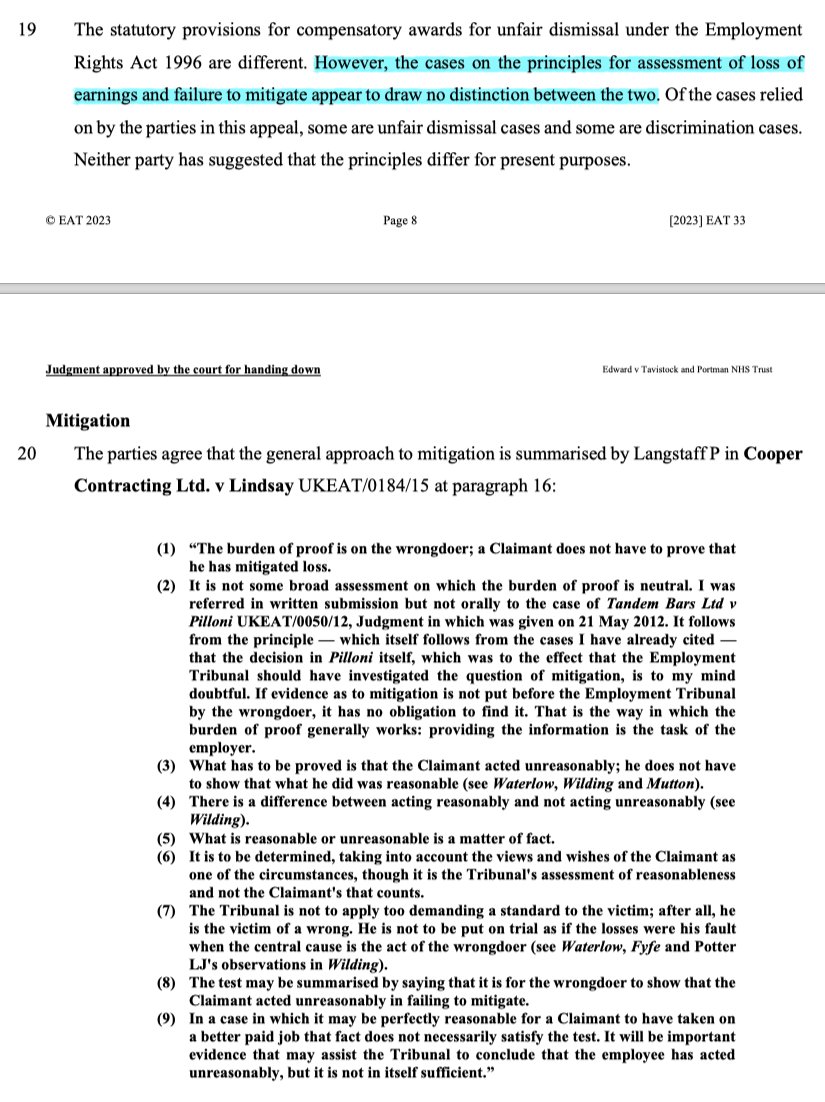
🧵Edward v Tavistock & Portman: EAT clarifies the approach to reductions for failure to mitigate loss, in upholding an appeal against ET 50% reduction in compensation for failure to mitigate. The judgment deals with both burden & whether a % reduction can apply.
#ukemplaw
#ukemplaw
2/ C worked for the NHS as a band 5 data officer. He was downgraded to band 4 & dismissed on grounds of there being no band 4 vacancies. An ET found the failure to redeploy was victimisation for having made allegations of discrimination. The matter then went to a remedy hearing.
3/ C was out of work for 2.5 years before getting an 8 month fixed term contract. For the 2.5 year period, the ET found that C didn't apply for Band 4 roles, there came a point when he should have, & reduced compensation of past loss by 50% to reflect the chance of getting one.
4/ The EAT allowed an appeal against the ET's approach. Its treatment of mitigation of loss is instructive.
1st it noted there's no difference between the principles on mitigation in unfair dismissal cases as against EqA cases. Thus Cooper Contracting v Lindsay is applicable.
1st it noted there's no difference between the principles on mitigation in unfair dismissal cases as against EqA cases. Thus Cooper Contracting v Lindsay is applicable.

5/ The EAT noted that the usual approach to future loss of earning, as per Wardle, is to determine when an employee mitigating was likely to get another job on equivalent terms & to calculate loss to that date rather than to apply a % reduction. 



6/ Gardiner-Hill takes the same approach to past loss of earnings, requiring findings of what steps should have been taken & when it would have produced an alternative income & to then apply that in calculation of loss rather than a % reduction approach. 

7/ The EAT looked at the earlier authorities inferentially referred to in Gardener-Hill as well as those applying it, including approval in AON Training v Dore, noting limits to how directly they engage with the question of whether a % reduction is a wrong approach.
8/ The EAT turned to Hakim v Scottish TUC, which dealt with the appropriateness of a % approach & left open, in obiter, that it may be appropriate in some cases as a crude means of determining loss. Gavin Mansfield noted that this was not explored in detail by Lord Summers. 

9/ The EAT in Edward endorsed from Hakim that there's no need to give a false appearance of precision when fixing the suitable point in time for calculation purposes - it's an evaluative exercise evaluating a counterfactual. 

10/ The EAT considered the loss of chance cases, noting their regular application by the courts to counterfactuals in other areas of the law. The EAT disagreed with C's submission that BCCI v Ali (No.2) showed that loss of chance couldn't apply to past loss in employment. 

11/ However, whilst clearly unhappy about it, the EAT found Gardiner-Hill binding against loss of chance %, whilst noting its inconsistency with the rife use of % in other areas of ET remedy, such as Polkey & Chagger.
He's clearly setting this point up for a further appeal.


He's clearly setting this point up for a further appeal.



12/ The EAT gave helpful guidance: apply the Cooper Contracting guidance on burden. If the R satisfies that test, ask the Gardiner-Hill questions (if relevant) on counterfactuals applying a balance of probability standard. There's no need to identify a specific job. 

13/ The ET in this case didn't apply the correct approach. It couldn't be extrapolated from the 50% reduction that it had done so. 

14/ Thus the ET in the present case had erred both in failing to apply the burden correctly as per Cooper Contracting and also in applying a % reduction rather than following the Gardiner-Hill approach to past loss.
• • •
Missing some Tweet in this thread? You can try to
force a refresh









